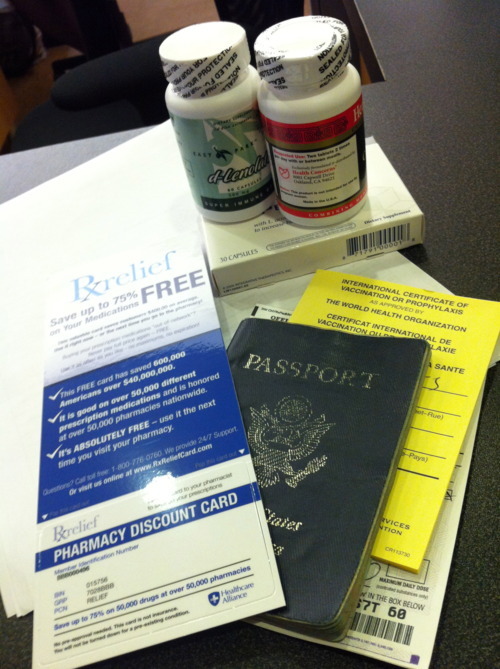Tucking medicine into a white bag, and walking to the taxi from the travel clinic with all the proper prophylactics in hand reminds me of our preparations for first day of school.
It’s a lot like carting away boxes of pencils, and bright shining pen and eraser bags, the dreams of the days to come stowed away in their crinkling plastic wrappings. Thoughts of the new things to be discovered and the people you have yet to meet teem in the head. There is a spring in the step.
The difference today is that my right arm is very sore where my doctor injected yellow fever vaccine. And my left arm is throbbing, right around the shoulder area, where I was hit twice for an adult polio booster, thank you, and a jab for typhoid.
It’s not because these places are dirty. Certainly India and Kenya are going to be a challenge when it comes to finding constant sanitary — not just wholesome — food.
It’s also because you need to travel smart. It’s because, as my doctor warned me yesterday, there are outbreaks of polio, and yellow fever, as well as a high risk for malaria in a couple of the places I will be visiting. So, I am armed.
I got loaded up with three inoculations and had scripts written for a malaria medicine that apparently also fights off the potential dysentary I am liable to contract by walking by street food on the streets of Calcutta. She also gave me three different herbal supplements that will make my stomach safe, and also will remove any parasites that might find their way into my naan or my bottled water. I’m okay with all of this.

She stamped my yellow card, which I hope will be stamped in several other locations around the world. It certifies I am no danger to the countries that I enter, and that I can withstand the wiles of yellow fever-laden midges and mosquitoes that will haunt me in my sleep.
I was also handed a useful sheet about rabies, apparently for Kenya and Morocco, that suggests to me that “bats can bite without any apparrent reason and sometimes leave no indication that you have been bitten.” I think here she is referring to vampire bats and other blood sucking winged mice that have an anesthetic in their bites that leave you clueless you have just received a virus that will literally rot your brain.
Travel carries with it risk, but travel also creates opportunities for self-awareness, for learning as you go, and I encourage inoculation to anyone who even thinks about traveling outside of the US.
The problem is, these things are very expensive. No health insurance covers it, because, even though we are talking about vaccinations, health insurance companies do not consider this preventative care. In their standards, inoculations for international travel has nothing to do with living a healthy lifestyle — I am assuming to them it is a luxurious add-on to a life of global trekking.
It’s a shame, because consider all that would be open to people if their standard of care could include international immunizations (and yes, I know we are talking about a huge regimen).
Work exists out in the world.
The world is every day more and more international. Opportunities exist in the developing world that would never exist in the developed world.
As we were talking, my doctor mentioned the theory of the De-Developed Nations, as I talked to her about my idea of creating media that is about the fringes and not about the mainstream.
I said that I wanted to prepare people in higher standard living areas for the evolution to come of living in a world that was much more like the third world than the first world.
I believe we will all have to being living lifestyles that demonstrate we are mindful of the fragile ecosystem we sustain and use.
John Holdren wrote about it in the 70s, when he realized that massive global development that mimicked how the US had grown and was growing (keep in mind there was an oil crisis at this point) would inevitably put milions and millions of people at risk, leaving them to live a life that was less than satisfactory.
“The need for de-development presents our economists with a major challenge,” they wrote. “They must design a stable, low-consumption economy in which there is a much more equitable distribution of wealth than in the present one. Redistribution of wealth both within and among nations is absolutely essential, if a decent life is to be provided to every human being.”
Holdren, who is director of the White House Office of Science and Technology Policy, made these comments in the 1973 book “Human Ecology,” which he co-authored with the Ehrlichs, long-time advocates of curtailing population growth.Over the years, Holdren has co-authored or co-edited a number of books and articles with Paul Ehrlich.
In the 1977 science textbook, “Ecoscience: Population, Resources, Environment,” which Holdren also co-authored with the Ehrlichs, the authors again presented their idea for “de-development.”
The 1973 book, “Human Ecology,” argued that humanity would face environmental calamity if population growth was not curbed.
Why I Am Going to Africa
In Kenya, 500,000 graduates a year compete for 70,000 job slots each year. It has given rise to the “hot sun” road vendors that line Kenyan streets throughout the country. You will see, so I am told, people in their 20s and 30s setting up shop on roadsides to sell shoe servicing, tire repair, welding, barber services and more.
An impoverished 78% of the country has to be entrepreneurial.
Looked at another way, you can see this kind of thing happening in the US. Graduates can not find jobs that are worth their weight in college tuition. They are forced to come up with different ideas, or to take jobs that are not at all aligned with their passions or their skills.
I think it’s one of the reasons giving rise to sites like Airbnb, and other contributors to the sharing economy.
Pooling resources and relying on friends, rather than corporations, to get jobs done, is the new world order.
When people marvel at my travel schedule, I say to them, “It’s not because I am a jetsetter. Jetsetting is a lifestyle I cannot afford.” Just as McDonald’s has spread around the world to create a standardized eating experience that is low-cost and pervasive, their will be lessons learned in the developing nations that will re-order how we live here.

I cannot say what all they are, yet. I am still trying to figure that out. But join me on these journeys. Tell me what you think, where I should go. Follow me here.
I travel around the world — to China, India, Kenya, South America, and other parts of developing Europe, as well as Hong Kong and Singapore — to do work that researches this de-developing trend and it applies it to how companies can re-shape their media offerings, brand offerings, marketing and communications strategies.
Tell me what I should know, who I should meet, and what I should consider in helping work out new business in this economic reality.

Douglas Crets is an intelligence officer and expert network builder for the social web. Using his training in journalism, digital media, anthropology and the humanities, he creates social media research projects for and about the leading social web entrepreneurs of today. His company, dB C Media provides companies and individuals with data, behavioral research studies, branding advice, consulting on social media execution and meaningful media content to create efficient interactions with consumers, and influencers and on the web, so that brands, companies and individuals can form relationships that matter. His traveling takes him to at least 12 countries a year. He speaks Russian and understands Chinese.








